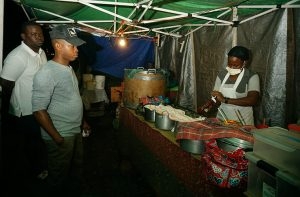‘A breath of fresh air’
THE gradual re-opening of the local economy has released a burden from businesses, which have been ‘suffocating’ because of the necessary control measures implemented by authorities to reduce the spread of the dreaded novel coronavirus (COVID-19).
Businesses across the country have been unable to “catch their breaths” since March 2020, when Guyana recorded its first case of COVID-19.
Guyana had recorded an estimated real Gross Domestic Product (GDP) growth of 45.6 per cent at mid-year, driven mainly by the country’s petroleum sector. But the non-oil economy contracted by 4.9 per cent due to significant declines recorded across many major industries.
Ailing sectors, a rising unemployment rate, lack of jobs and a dreaded disease, were, and in some cases, still, are some of the threats facing the country which sits on the edge of South America and has a population of about 750,000 persons.
In recognising the debilitating effects of the dreaded disease on the economy, the new government has taken steps to rejuvenate ailing sectors and restore stability, all while maintaining focus on safeguarding the health of every Guyanese through various control measures.

Among some of the resuscitative measures are the reopening of the country’s international airports; the reduction in the hours of the national curfew; extension in the time for businesses to operate; and the authorisation for businesses to operate in a safe manner, although at half of its regular capacity, in some cases.
“These measures provide an opportunity for businesses to breathe again,” said Chief Executive Officer (CEO) of the Small Business Bureau (SBB), Dr. Lowell Porter, during an interview with the Guyana Chronicle, on Tuesday.
While health authorities have said it is too soon to determine if COVID-19 is endemic, Dr. Porter, like many other persons, shares the view that this disease is the “new norm”.
“I think COVID-19 is the new norm so we cannot keep closing down the economy… we can open up and deal with precautionary measures… once established properly, of course, we will have regeneration in the economy,” the CEO reasoned.
The potential benefits of safely reopening the economy include the circulation of more money; the employment or re-employment of persons; and positive revenue streams for businesses, particularly medium, small and micro enterprises.
LIFEBLOOD
Small businesses are often referred to as the lifeblood of any economy because they give entrepreneurs the opportunity to create meaningful jobs and foster local economies, allowing money to stay closer to communities.
And, throughout the world, many persons have gone out of business because of the four-five months ‘lockdown’ caused by the COVID-19 pandemic. This has been the case in developed nations, so the effects on Guyana — a nation with GDP of just about US$4 billion — are understandably harsh.
“Many of the businesses in Guyana are micro to small, so you could imagine the great degree of difficulty the pandemic can cause,” said Dr. Porter.

The bureau had recently conducted an online survey which received 243 responses from small businesses. And, of those responses, 63 per cent had indicated that they had to close completely because of the pandemic.
This, he said, was due mainly to the established guidelines which allowed only essential businesses to operate.
“So I support the reopening of the economy or relaxation of some measures…while some businesses were able to weather the storm and survive, others founds it difficult and will welcome any relaxation,” said Dr. Porter, adding that lots of help is still needed.
President Irfaan Ali, in outlining measures included in Budget 2020, had said that the Government, after re-prioritising and re-programming fiscal measures, has managed to add $20 billion in relief to the “pockets” of Guyanese at a time when the nation is faced with the effects of COVID-19, and the recently-concluded protracted electoral process. The conduits of relief include revised tax measures and sweeping incentives.
The broad objectives of those measures which feature in government’s emergency budget are to stimulate economic activity; get persons back to work; increase Guyana’s productive capacity; reduce the cost of doing business; improve efficiency; and facilitate growth and development of businesses.
While Government has implemented those measures, a lot is expected from the private sector, as it has a big role to play in driving economic growth. The extraordinary circumstances created by COVID-19 had been discouraging in some cases, but resuscitative measures have improved the prospects for businesses.
“There will be an increase in economic activities and increase in employment of persons, as businesses open late… there has already been an immediate impact, as people are looking to get as much activity in before Christmas,” said Chairman of the Private Sector Commission (PSC), Nicholas Boyer in an invited comment on Tuesday.
MUST BE MINDFUL
Boyer said the retail and tourism sectors, among others, are expected to flourish, but persons must be mindful of COVID-19.
He cautioned that while persons are looking forward to an increase in economic activities, they must be cognisant of COVID-19 and adhere to the control measures.
These emergency measures were made pursuant to Paragraphs (1) and (2) (b) of the Direction by the President, given under the Public Health Ordinance, Cap. 145, and published in the Gazette, Legal Supplement –B, on March 16, 2020.
According to health authorities, the COVID-19 Emergency Measures (No. 8) will expire on November 30, 2020, unless earlier terminated, extended or amended by notice of the Minister of Public Health after an assessment of the prevailing public health conditions.
Persons, whether consumers or retailers, while conducting business, must do so according to the social distancing guidelines and have the requisite protective equipment.
This view was shared by Chairman of the Essequibo Chamber of Commerce, Rupan Ramotar, who said persons must also “go the extra mile” by building their immune system, exercising and eating healthy.
Safety, he said, has been a priority for businesses in Essequibo, from the farm to office. With many persons already adjusting to the situation, he said businesses would be able to do even better now, with a more relaxed environment.
President of the Region Three Chamber of Commerce, Halim Khan, has also said that as the COVID-19 pandemic continues to evolve, organisations need to rethink and reconfigure their businesses.
He explained that the coronavirus outbreak has forced businesses to re-evaluate how contact centres are leveraged, how employees deliver relevant customer experiences, where they work, and how digital channels can be used to support business continuity through the crisis and beyond.
“Businesses welcome the opening but persons are now more aware of the seriousness of COVID-19 and many persons are making use of the delivery services,” he said.
But, he maintained that the pandemic has undoubtedly changed the attitude and behaviour of customers, employees, citizens and every human being.






















